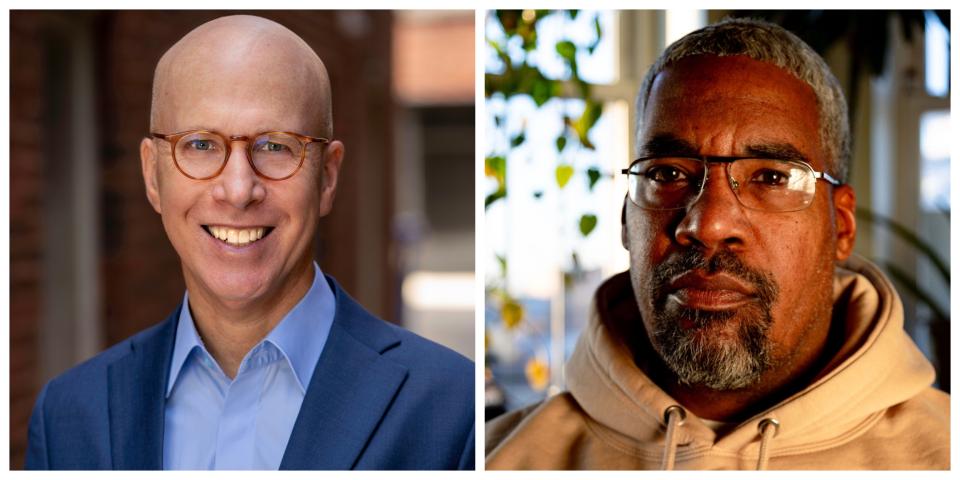Jonathan Eig and Yohance Lacour: New Perspectives on Stories From the Past

2024 Biography Prize winner Jonathan Eig (left) and 2024 Audio Reporting staff contributor Yohance Lacour (right). (File)
A transcript to this episode is available here.
Journalist and historian Jonathan Eig won the 2024 Biography Prize for King: A Life, a revelatory book on Martin Luther King Jr. that draws on new sources to enrich our understanding of the civil rights leader’s life. When Eig heard the 2024 Audio Reporting Prize-winning You Didn’t See Nothin, he knew he had to talk with the podcast host, journalist Yohance Lacour of the Chicago-based Invisible Institute. In this award-winning podcast, Lacour revisits his reporting and experience of covering the 1997 brutal beating of 13-year-old Lenard Clark, a story that Eig also covered as a Chicagoland journalist back in 1997.
In autumn 2024, Eig and Lacour met on an appropriately windy day in Armour Square Park in Chicago. The two journalists discussed what it means to revisit old stories in order to offer new perspectives, with both writers exploring the political dimensions of their respective work after decades of research and introspection.
Lacour considers the alleged links between Black community leaders, white power brokers and associates of the American Mafia's Chicago Outfit as they wrestled with the social and political impact of the Lenard Clark beating:
"[...] you got Frank Caruso Jr., who led the gang of what I suspect was six or more Italian young men who beat Lenard Clark, at least chased and helped beat Lenard Clark damn near to death. He was the son of Frank Caruso Sr., who was a Chicago Italian mafia member with ties that literally go back to Al Capone. You got Herbert Martin, who was a Black minister with a pretty powerful voice in this area who was already kind of in bed with the Carusos and the city. And, you know, [the] Carusos basically bought him. And in exchange for that silver, he started to quell stuff and then he wasn’t alone."
(Interested listeners might also want to explore the work of muckraking journalists like 1972 Commentary winner Mike Royko, who exposed the city's corrupt political infrastructure to a national audience).
Likewise, Eig addresses the increasingly porous divide between conspiracy theories and historical revisionism in his account of King's surveillance by the J. Edgar Hoover-directed FBI:
"Whether or not they hired somebody or arranged for James Earl Ray or someone else to pull the trigger, they intentionally created the conditions in which some racist white man would think that it was a good idea, that he was doing his patriotic duty to assassinate Martin Luther King. There's no question the FBI did that. That's not my opinion. That's a fact."
Both journalists also address the importance of collaboration – and the role journalism can still play in helping America heal from the past. As Lacour notes, "America conditions us to hold shit to our chest. We’re so competitive. [...] I can't let you in because you might take from me. So my hands are always clenched. [...] That's an important lesson for just everybody in this place to learn, no matter what they do."
Click here to learn more about the Pulitzer on the Road Podcast and to listen to more episodes.
The Pulitzer on the Road Podcast is a production of the Pulitzer Prize Board and is produced by Pineapple Street Studios. Our host is Nicole Carroll, Pulitzer Board member and professor of practice at the Walter Cronkite School of Journalism and Mass Communication at Arizona State University. Senior producer is Justine Daum, and executive producers are Bari Finkel and Pulitzer Administrator Marjorie Miller.
Subscribe to the show at Apple, Spotify, YouTube, Amazon Music or wherever you get your podcasts.
